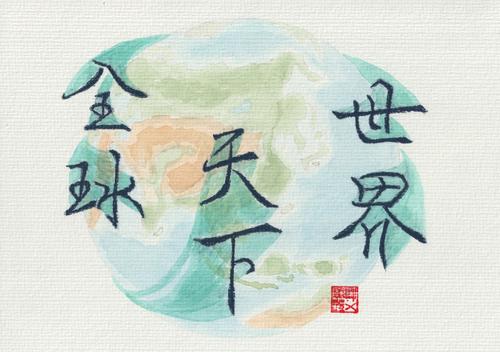A Translingual Conceptual History of Chinese Worlds (諸多“世界”的概念:跨語際概念史)
This project analyses how specific terms and concepts generate worlds. Terms can be corrected or distorted, depending on one’s point of view. Intentionally or not, worlds are created by composing and decomposing terms, shifting emphases, or by assigning terms to new semantic fields in specific discourses (Goodman 1978: 7-17). How do terms shape processes of world creation? What role do translingual entanglements and interdependences play in these processes? How is the future shaped by the use of certain terms, consciously and unconsciously?
The project has three main focuses:
- The semantic field “world” encompasses a broad variety of different terms in the Chinese language (such as shijie 世界, tianxia 天下, datong 大同, quanqiu 全球). How are these terms for "world" used in Chinese and which ideas of worlds do they generate?
- In addition, the project considers certain Chinese key terms of specific thematic areas (e.g. global history, global health, history of science or philosophy), thereby examining their impact on Chinese "world" concepts.
- The project bridges the individual projects by reflecting on the critical-analytical (world) terminology developed in the respective projects, including social worlds (Berlin), world orders (Göttingen) and life-worlds (Heidelberg).
Our methods and approach are translingual, inspired by Lydia Liu's Translingual Practices (1995). They take up recent efforts in conceptual history to reach beyond the boundaries of specific linguistic areas (as was common in Brunner & Conze & Koselleck Geschichtliche Grundbegriffe (1972-1990)) and to conceive conceptual history globally in dialogue with Chinese scholars (Sun Jiang 2012; 2018; Pernau & Sachsenmeier 2016) and at the same time facilitating a dialogue across disciplinary boundaries (Maissen & Mittler 2018).
Brunner, Otto, Werner Conze, and Reinhart Koselleck, eds. 1972-1997. Geschichtliche Grundbegriffe: Historisches Lexikon Zur Politisch-Sozialen Sprache in Deutschland. 8 vols. Stuttgart: Klett-Clotta.
Goodman, Nelson. 1995 [1978]. Ways of Worldmaking. 7th ed. Indianapolis: Hackett.
Liu, Lydia He. 1995. Translingual Practice: Literature, National Culture, and Translated Modernity - China, 1900-1937. Stanford: Stanford University Press.
Maissen, Thomas, and Barbara Mittler. 2018. Why China Did Not Have a Renaissance - and Why That Matters: An Interdisciplinary Dialogue. Berlin: De Gruyter Oldenbourg.
Pernau, Margrit, and Dominic Sachsenmaier. 2016. “History of Concepts and Global History.” In Global Conceptual History: A Reader, edited by Margrit Pernau and Dominic Sachsenmaier, 1–16. London: Bloomsbury.
Sun Jiang 孙江. 2012. “Gainnian, gainianshi yu zhongguo yujing 概念、概念史与中国语境 (Concepts, Conceptual History and the Chinese Language).” Shixue yuekan 史学月刊 (Journal of Historical Science) 9: 5–11.
Sun Jiang 孙江. 2018. “Gainanshi yanjiu de Zhongguo zhuanxiang 概念史研究的中国转向 (China‘s Turn of Conceptual History Research).” Xueshu yuekan 学术月刊 (Academic Monthly) 10: 150–74.

